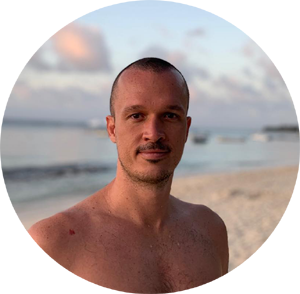How to relieve stress in 2020? The ultimate guide
Written by: Loris Vitry (holistic coach)
Validated by: Cathy Maillot (Osteopath)
Caution: If you have any medical questions or concerns, please speak to your doctor. Even if the articles on this site are based on scientific studies, they do not replace professional medical advice, diagnosis or treatment.
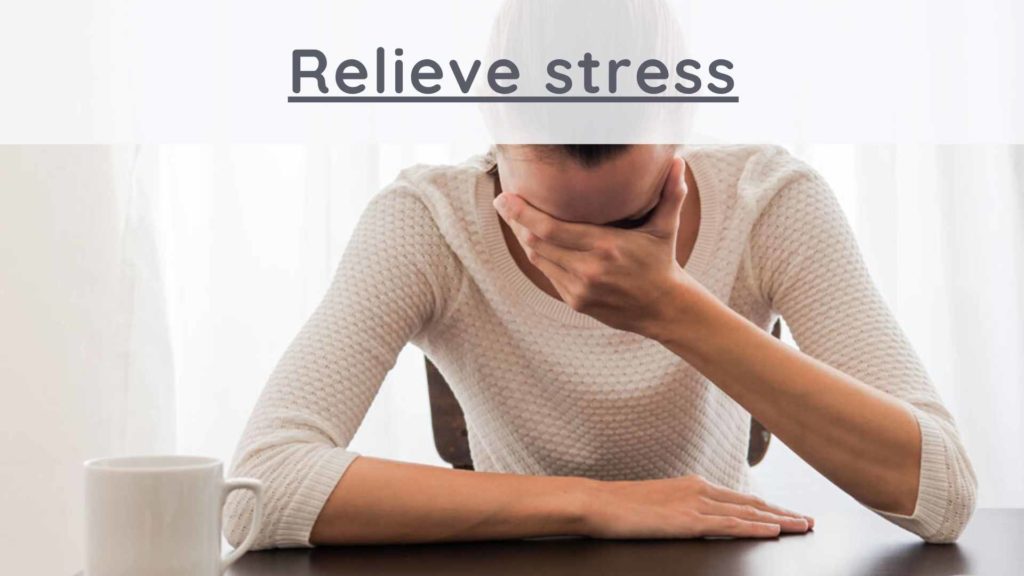
Reading this complete guide (30 minutes of reading) can transform your life if you are :
– a stressed person who wants to find calm
– an anxious person who wants to regain self-confidence
– a therapist who accompanies stressed people
If fighting stress is one of your priority, then let’s start.
What is stress ?
Stress is a physical, emotional or psychological reaction to a so-called stressful situation. We can distinguish several types of stress: the good stress (sometimes called “eustress”), the intense stress in the short term, the chronic stress or the post traumatic stress.
The right stress or “eustress”
And yes, stress in small doses is good for your health, it is even vital to maintain the proper functioning of your body.
In general, dealing with small, manageable stressors every day improves your physical, emotional and psychological functioning.
For example, walking at slow pace is a good stress.
Your body is slowly adapting to this low intensity physical effort.
Your body heats up, your muscles and joints relax, your breathing remains relaxed, your heart rate stays calm, your mind does not perceive any danger, the stress is minimal.
Low dose stress even reduces your negative stress hormones : for example, walking decreases cortisol, an hormone which is secreted in case of chronic stress.
Good stress therefore reduces bad stress.
The boundary between good and bad stress simply depends on its intensity and duration.
For example, walking slowly a few hours a day is a good stress.
But walking slowly for 48 hours in a row without sleep is a negative (chronic) stress.
Another example: walking slowly every day is a good stress.
But sprinting every day at full speed is intense stress.
We can take examples in all possible fields:
– working is good for health, but working without rest leads to burnout
– sport is good for you, but too much sport exhausts you and causes injuries
– manage a few small daily challenges energizes you while constantly having problems exhaust you
Everything is a question of dosage …
Intense stress in the short term
There are two schools of thought regarding intense stress in the short term.
The first considers it as positive and the second as negative.
Let’s see this in detail.
On one hand, we have Western philosophy, which can be summed up as “no pain no gain”.
In other words, you must suffer to progress.
It will be considered that the short-term intense stress is beneficial because it will force your body, your nervous system or your mind, to adapt and progress.
For example, it is the philosophy of HIIT (high intensity interval training) that offers a short and intense training.
Instead of walking a few hours, you will be told to do some sprints at maximum intensity over a period of a few minutes.
As another example, some people prefer to alternate a phase of intense work with a phase of intense rest.
For example, they will prefer to work for several days in a row and then rest for several days before starting again.
This is often the case for professions such as : flight attendant, nurse, etc.
Also, some people will prefer to finish their work late at night, even if they have to spend a sleepless night, rather than sleep to pick up the next day.
But on the other side, we have the Eastern philosophy which can be summed up as “everything in small doses”.
In other words, you must find balance in all things without falling into extremes.
Indeed, Taoist philosophy considers intense stress in the short term as very negative because it causes the exhaustion of the body.
Indeed, unlike the good stress that decreases stress hormones, short-term intense stress releases adrenaline, a stress hormone produced by the adrenal glands, which are endocrine glands located just above your kidneys.
In Taoist terms, intense stress exhausts your JING, or the energy of the kidneys.
In other words, you simply exhaust your adrenal glands, which causes a terrible problem : the exhaustion of the adrenal glands and all the associated symptoms, fatigue, burn-out, depression, etc.
Uninformed people tend to abuse their JING, the energy of the kidneys, constantly pushing their physical, emotional and psychological limits.
But it lasts only a time, until the day of exhaustion.
At this moment, the individual will seek at all costs to get out of his chronic stress.
What is chronic stress ?
Chronic stress is simply intense stress that lasts too long.
If you experience intense stress once a week or a month, it is acceptable because your body has plenty of time to recover, regenerate and adapt.
But if you experience intense stress daily, or even several times a day, the consequences will be dramatic.
Let’s take several examples to understand.
If you start running or playing sports every day without resting, you’ll sooner or later end up in chronic stress.
This will be manifested by joint pain, physical injury and more generally intense fatigue.
Another example : if you live every day in a climate of emotional tension, perhaps with the person with whom you share your life, perhaps at work with your colleagues or directors, perhaps simply with your own negative thoughts that generate unpleasant emotions.
All these situations will also end up generating a very negative chronic stress.
This will manifest as a form of depression, hypersensitivity to stress, irritability, etc.
In short, if your intense stress lasts too long, you will end up exhausting your Jing, your kidney energy.
JING is considered as your life essence, as your life span, as your vital reserves.
In other words, chronic stress kills you, destroys you, and shortens the length of your life.
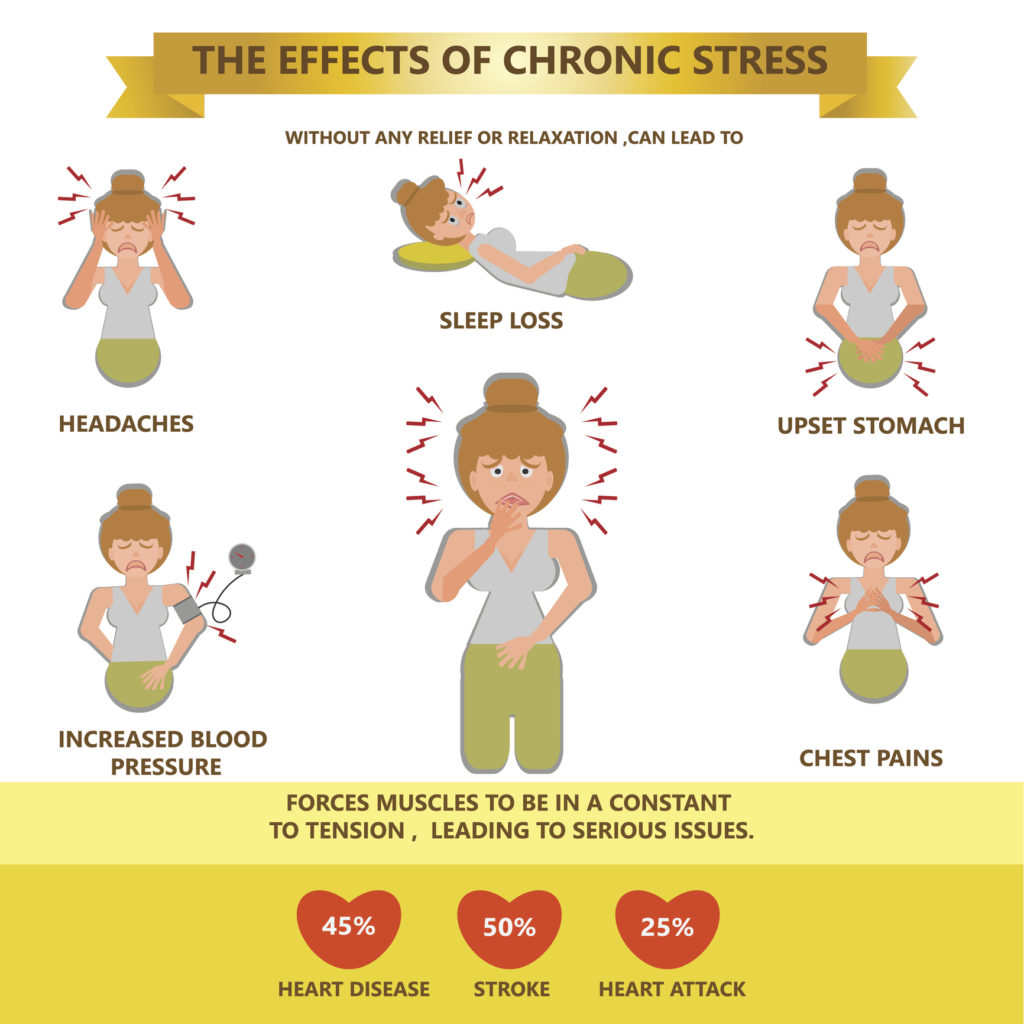
It’s therefore urgent to find effective solutions to fight against intense stress, but also solutions to quickly get out of chronic stress.
Post Traumatic Stress
Post traumatic stress occurs as a result of emotional and psychological shock.
These traumas of the past have generated a phenomenon of somatization.
In other words, the emotional shocks experienced in the past have not been digested, but inscribed in the body.
Somatised emotions generate blockages that will generate immense stress in everyday life.
The individual suffers daily as if he relives the past situation.
Fortunately, there are many emotional release therapies that allow people to clear their blocked emotions in the body, and thus free themselves from their post-traumatic stress.
What is the difference between stress and anxiety ?
As we saw above, stress can have several levels of intensity.
First of all, there is good stress when it’s weak to moderate.
Then, there is intense stress in the short term when we seek to exceed the limits of our body.
And finally, there is chronic stress, which is a negative stress that has been going on for too long.
But the longer this phase of chronic stress lasts, the more your nervous system is exhausted.
It is at this moment that anxiety, fear or panic begin to appear in your life.
The anxiety is therefore simply the result of an exhausted body, adrenal glands that no longer function properly, a weak kidney energy (Jing).
In short, anxiety is a state of physical, nervous and psychological exhaustion.
But whether stress or anxiety, the symptoms are always the same, but at different intensities.
The symptoms of stress
The symptoms of stress are always the same because our brain works the same way.
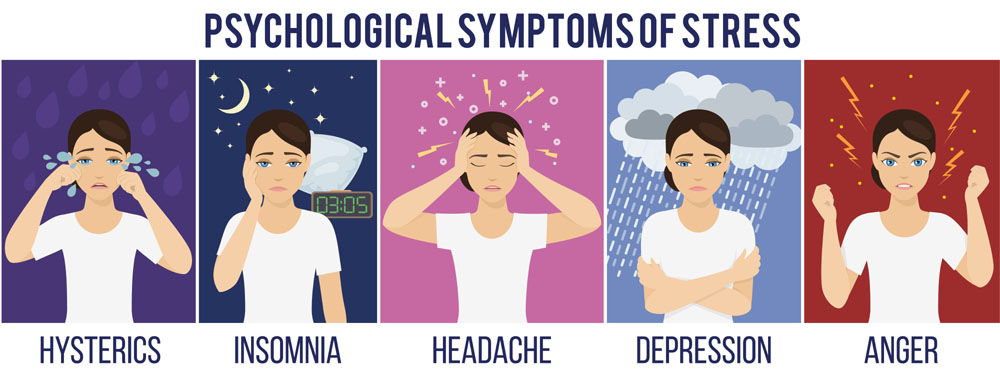
Everything happens precisely in your reptilian brain.
This is your animal brain, the one we share with other animals.
It is this part of our brain that manages our entire stress response and it’s often the same symptoms that come up every time :
– sweat
– palpitations
– blocking breathing or hyperventilation
– Lightheadedness and vertigo
– tremors
– have a lump in the throat
In fact, there could be hundreds of symptoms, and you probably have one that is dominant in your case … but all these symptoms of stress all have the same thing in common : blockage and contraction.
Ancestral doctors said that any disease is a blockage of energy caused by stress, be it physical, emotional or psychological.
As a matter of fact, these three parts of our being, physical, emotional and psychological are linked.
A psychological blockage often leads to an emotional blockage that will eventually somatize into your body in the form of a physical blockage.
For example : psychological fear creates an emotion that will contract your diaphragm, the muscle of your breath.
Years of fear and anguish end up blocking your diaphragm and therefore your breathing.
Say goodbye to your good cellular oxygenation.
The opposite way is also true : a physical blockage often causes an emotion (pain) then a negative thought.
For example : constantly bending forward looking at your phone will end up creating feelings of inferiority and negative thoughts that will validate your feelings.
To conclude, no matter the symptom that spoils your life, the underlying symptom is always a blockage, a tension, a contraction.
The physiological consequences of stress
This chapter is one of the most important in this guide on stress reduction and stress management because you will understand the profound physiology of stress and therefore the consequences on your body and mind.
In the previous chapter, we saw the main physical symptoms of stress : heart palpitations, profuse sweating, blocked breathing or hyperventilation, tense solar plexus or lump in the throat, and so on.
But did you know that all these symptoms are caused by the same physiological process ?
In truth, a single physiological factor will cause a cascade of unpleasant reactions to become sick or even die in case of extremely intense stress.
First of all, you must know that it is your reptilian brain that will trigger all these symptoms, but it will do it through your breath.
Your breathing and stress
When your subconscious reptilian brain perceives an inner or outer stress, it will immediately change your breathing pattern and therefore the amount of oxygen you will breathe.
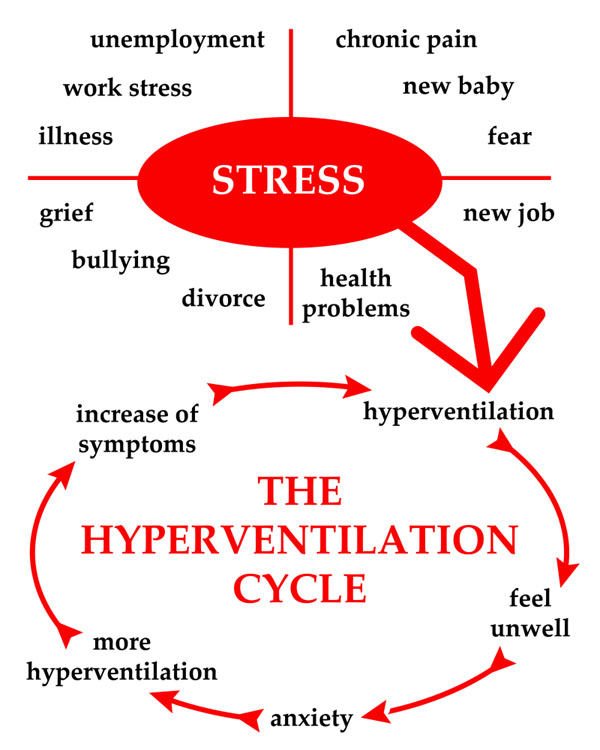
Even if your breathing is blocked during an intense stress like when you are afraid for example, you still breathe much more in volume per minute (at the scale of a whole day).
For example, a serene person calmly breathes about 6 liters of air per minute, or 8640 liters per day.
A slightly stressed person about 8 liters per minute, or 11,520 liters per day.
It goes unnoticed, the person does not even notice it himself.
But a very stressed person will sometimes breathe up to 16 liters per minute or more, or 23,040 liters per day.
Although the breathing sometimes slows down, at the scale of one day, the person still suffers from a hyperventilation syndrome.
Stress therefore has the physiological effect of increasing your volume of breathed air, thus to make you breathe faster and more in quantity.
The physiological consequence of breathing more
90% of people have a mistaken belief : they believe that by breathing more, they oxygenate more.
It is a huge mistake that even yoga teachers or sophrologists teach their students.
In truth, it is the opposite : the more you breathe, the less you oxygenate.
Indeed, whatever the speed at which you breathe and the amount of air you breathe, your oxygen saturation in the blood is always maximum: about 95 to 100%.
You can hyperventilate and do all the yoga techniques you want, this physiological variable will never move, except in case of serious diseases.
Whether you breathe 6 liters or 50 liters of oxygen per minute will not change your oxygen saturation in the blood …
On the other hand, there is one variable which varies continuously according to your respiratory rate, it is your concentration in CO2 (carbon dioxide).
The more you breathe (hyperventilation), the lower your CO2 concentration.
This means that physiologically, stress decreases your CO2 level without affecting your oxygen level in the blood.
In other words, stress (breathing more) does not affect your blood oxygenation, but your CO2 concentration.
Here again, some people have the mistaken belief that CO2 (carbon dioxide) is a waste that must be evacuated from the body by exhaling as much as possible.
Unfortunately, it is only partially true and CO2 is vital for your life.
The Bohr effect, a physiological law described in all medical and physiology books, explains that the oxygen molecule is attracted by cells producing the most CO2.
The oxygen in your blood at maximum saturation will be released into your cells on one condition : that your cells produce enough CO2.
CO2 is the product of your metabolism.
In other words, it is a gas produced when your cells are active.
This means that your cells must be active to oxygenate (Bohr effect), otherwise the oxygen will loop in your bloodstream without ever being released into your cells.
But when you breathe more under the effect of stress, you evacuate a lot of CO2, which decreases your overall CO2 concentration in the body, and that cancels the Bohr effect.
PS: You have to differentiate between blood oxygenation and cell oxygenation. The first never varies with always maximum saturation, whereas the second varies second after second depending on your CO2 concentration and therefore the amount of air you breathe.
Conclusion : stress and associated hyperventilation, does not affect your blood oxygenation, but decreases your cellular oxygenation (by decreasing your CO2 concentration).
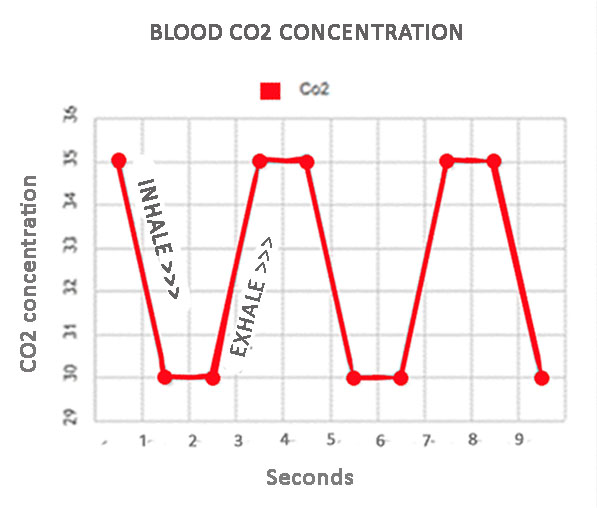
NOTE : The more you inhale (during stress and hyperventilation), the more you decrease your CO2 concentration…
Physiological consequences of low CO2 concentration
That’s where it’s really very interesting.
CO2 is a gas that has three very important characteristics for our life: oxygenation, dilation and sedation.
1) Oxygenation : we already talked about it, without CO2 in your cells, the Bohr effect does not work and oxygenation is impossible.
I remind you that you are alive thanks to your cellular oxygenation, it is the oxygen which produces your vital energy, your life.
Without oxygen in your cells, it’s death.
If you breathe too much (stress and hyperventilation), you decrease your oxygenation and therefore your vital potential.
2) Dilatation : CO2 has a dilatory effect on all your cells, whether muscular or nerve.
If you hyperventilate (stress), your CO2 level decreases and you cancel the CO2 expansion effect, which contracts your body and creates blockages.
Your diaphragm is blocked, you have pain in the joints, you feel tightness in the chest, you have a blood circulation problem, etc.
3) Sedation : CO2 has a calming effect on all cells.
When you are stressed, your thoughts are agitated, your body is agitated, in short you are no longer relaxed.
It’s not the stress itself that does that, but simply the drop in CO2 concentration.
A good concentration of CO2 will have calming effects on all your cells, which will bring you calm and peace.
As you can see, CO2 has all the antagonistic (contrary) effects to stress.
CO2 improves your oxygenation when stress decreases it.
CO2 expands your body when stress contracts it.
CO2 soothes your nervous system when stress excites it.
All the symptoms that we mentioned above : lump in the throat, palpitations, tightness in the chest, blocked diaphragm, difficulty in breathing, heavy legs, tremors, etc … are caused physiological by hyperventilating (breathing more than normal) ) and therefore by decreasing your CO2 concentration.
By understanding this, you realize that there is only one solution to really fight against your stress : better breathe (less quantity) and thus normalize your CO2 level to restore the 3 vitals effects : oxygenation, dilatation and sedation.
Before talking about different solutions to learn how to better manage stress and reduce stress, let’s first look at the causes of stress.
The causes of stress
To know what to do and how to act to reduce your stress, it is important to understand the source of your stress, and more precisely why you hyperventilate and therefore why you have a low concentration of CO2.
Hereditary stress
For 9 months, you have breathed exactly like your mother. Specifically, you shared the same CO2 concentration as your mother …
Ask yourself several questions : how was your mother’s pregnancy ? Was she serene and relaxed, or stressed and anxious ? Did she calmly breathe a normal volume of air or hyperventilate ?
By answering these questions, you can know exactly with how much stress you have come to the world.
Some people are fortunate to have a healthy mother with good stress management, these children will be the healthiest and those in better health.
On the other hand, some people have had an extremely stressed mother, worse an anxious mother, taking drugs or various drugs such as alcohol or cigarettes.
These children will obviously be the most unhealthy and those with the worst health problems.
Their life will be most of the time a great suffering.
This cause is the most difficult to eliminate because stress has impacted the fetus and its reptilian brain from a very young age.
In other words, it is the most normal point of reference that the brain knows.
It will be very difficult to recondition your breath, but fortunately, following the correct protocol like the one proposed by Stress.app, it can be done more or less quickly in a few months or years.
Indeed, it takes a certain time and a slower progression to recondition a reptilian brain already conditioned since fetal age.
But nothing is impossible with the brain and it can be rewired at any time, but you should know that hereditary stress is the longest to eliminate.
Environmental Stress
What country do you live in ? In what environment were you born and raised ?
Have you been born in a polluted big city where calm does not exist ?
Or have you had the chance to grow up in the countryside, in the middle of trees and nature, with the singing of birds to wake you up and the sound of locusts to prepare your sleep.
The quality of the air you breathe, the noise pollution in which you live, the smells you smell all day, the amount of visual solicitations that capture your attention … all this has an impact on your reptilian brain, your inner animal.
You can imagine that an animal, and of course the human animal, will be much more serene and relaxed, in an unpolluted natural environment, than in a concrete city where the noise is incessant.
Pollution of all kinds will make you breathe much faster, while nature will make you breathe much more calmly.
Food stress
In 1950, before the industrial era, the population was lucky to still be able to consume food of high nutritional quality but above all healthy food without any chemicals.
This food quality obviously had a positive impact on our intestinal flora, on our digestion and more generally on our level of happiness.
Indeed, it should be known that the intestines produce 95% of serotonin (relaxation hormone) and 50% of dopamine (hormone of love and happiness).
Unfortunately, today, eating healthy is almost impossible unless you live in the countryside and produce your own fruits, vegetables, and animal products.
We eat completely denatured foods : low in vitamins and minerals due to soil depletion, toxic natural foods due to the use of fertilizers and chemicals, sick animal products stuffed with drugs, or industrial foods empty of all life.
Modern food clearly represents a huge stress for the world’s population. And unfortunately, the world has become so polluted that the question is no longer : “how to eat healthy ?” but rather, “how to eat the least toxic possible ?”
But do not worry …
As you will discover in the Stress.app program, it is not a question of having the perfect diet because it is impossible, but it is rather about strengthening your ground, it is about strengthening your digestive capacity to be able to digest your meals even if they are toxic.
Voluntary hyperventilation
This is probably the worst scourge of the modern world : voluntary hyperventilation.
Indeed, hyperventilation is an immense stress that still has an addictive effect because it releases adrenaline.
Adrenaline is a stress hormone that gives you a feeling of power, a feeling of being the most powerful and strongest person in the world.
People are so fragile and unhealthy today that they are constantly looking for their drugs, their small dose of adrenaline to feel a little stronger, to hide the misery in themselves.
Which method hides voluntary hyperventilation ?
– deep breathing : and yes, practicing deep breathing as taught by 90% of therapists, is simply breathing more than normal.
Instead of breathing 6 liters, you start breathing 12 liters … more if you practice full breathing.
Sorry to disappoint you, but in physiological terms it’s called hyperventilation.
So you voluntarily release adrenaline, you voluntarily exhaust your adrenal glands, in short you deliberately create stress.
On the spot, you may feel good, but it is not a natural and profound well-being, but simply a side effect of adrenaline.
– popular breathing methods : There are whole classes of hyperventilation in yoga workshops for example, especially the Kundalini yoga classes.
Some methods even use hyperventilation to give (illusory) power to their practitioners like the Wim Hof method.
This technique is also found in methods such as connected conscious breathing (also called rebirth) where the student is invited to breathe more quickly and deeply.
In short, I seriously advise you to stop all your breathing methods that resemble near or far to hyperventilation.
Also avoid all therapists who inculcate false beliefs such as :
– you must exhale as much as possible to evacuate a maximum of CO2
– CO2 is a toxic waste that must be eliminated as much as possible
– breathe more and faster allows better oxygenation
– go beyond your limits to progress
All these claims will cause your loss !
And there are two cases for the therapists who promote them :
– they do not practice the exercises they teach, and this is often the case !
– Or they are addicted to adrenaline and they will also make you addicted until the day of their complete exhaustion or yours (burn-out).
What is the ultimate solution for eliminating stress ?
Which protocol to choose to stop this chronic hyperventilation syndrome that ruins your health ?
What is the best way to start reducing stress today ?
Before talking about giving you concrete solutions to relieve your stress quickly, let’s first look at what strategy you need to follow to get results.
How to reduce your stress effectively ?
Before talking about the anti-stress solutions, let’s first see how to follow the strategy.
And yes, if you want to reduce your stress in the long run, you need a solid strategy, a process that will give you real results in the long run!
Step 1 : Understand how your unconscious reptilian brain (hypothalamus) works
Before acting on your stress, you must first understand how stress is handled.
We have already seen that it is your reptilian brain that manages all your stress response.
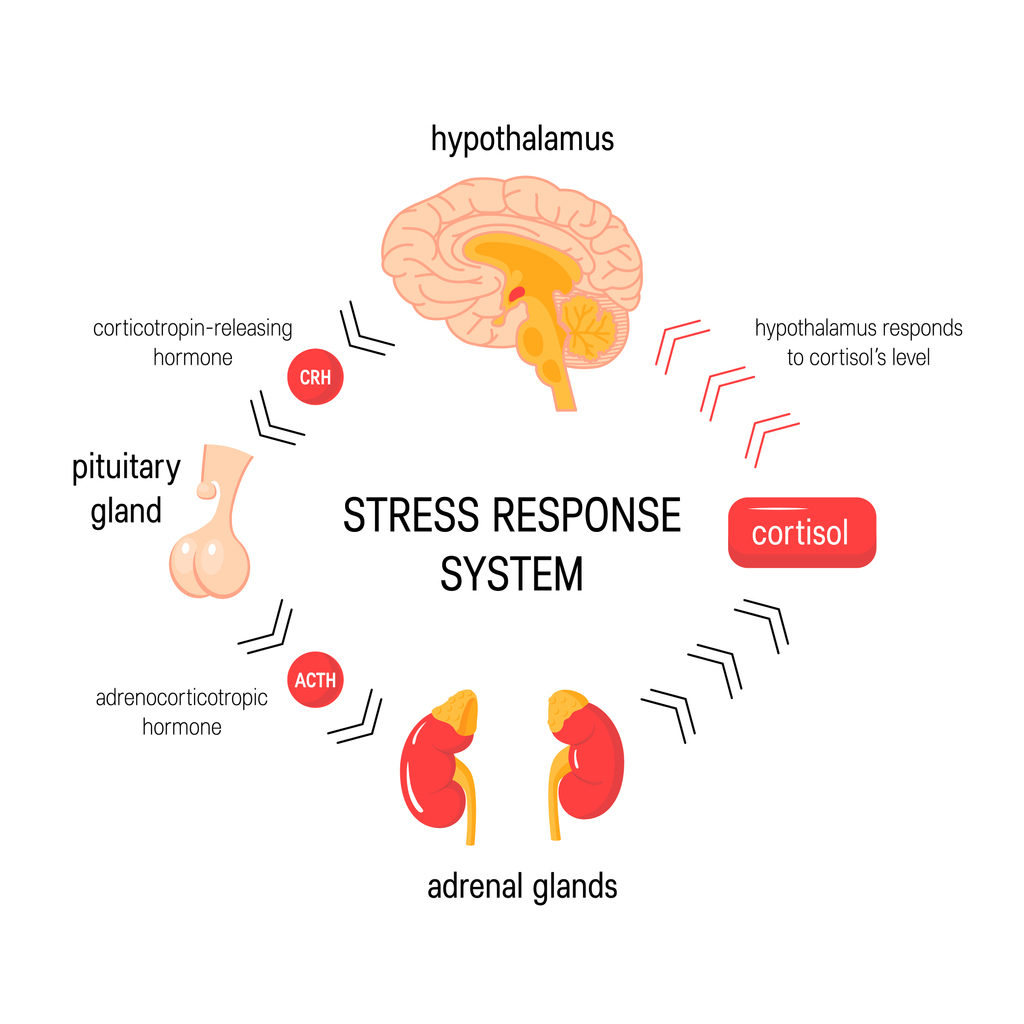
This part of the brain is unconscious, it means that you do not need to think about it or think about it …
Your reptilian brain (hypothalamus) automatically triggers all the reactions and more precisely the main reaction : the acceleration of the respiratory rhythm.
Your reptilian brain symbolically corresponds to your inner animal.
Behind the thinker that you are, the ego that evolves in the human world, you are above all an animal, a human animal evolving in a group.
The operation of an animal is simple : eat, drink, sleep, have fun, reproduce, mark its territory.
Unfortunately, these primary needs of your reptilian brain are completely ignored, which automatically and unconsciously generates stress.
For example, your inner aniimal will not appreciate if you go out all night (lack of sleep), if you stay in the noise all day long, if you eat too much or not enough (over-feeding or fasting often), if you do not have fun, etc.
Understanding your reptilian brain helps to know what to do to eliminate a very large part of your stress.
But do not worry, it’s been years that we master the functioning of the reptilian brain.
By following the Stress.app program, you will have the ideal protocol to reconnect with your primary needs to quickly reduce your stress level.
Each module of the program contains a practical part (exercise of the week) but also a theoretical part to understand what you practice.
Understanding is as important as practice.
Step 2 : Measure your stress level
90% of anti-stress programs on the market ask you to rate your stress level with a score from 0 to 10 … before and after using their anti-stress technique.
Unfortunately, there is nothing more random than a judgment based on your feelings.
Indeed, maybe you are in a good day, and tomorrow will be a bad day.
In short, it is a very unsatisfactory method of measurement.
To test your stress level seriously, you must take physiological measures related to your reptilian brain.
And that is easier than we think.
1) your heart rate : your heart is automatically managed by your reptilian brain.
In case of stress, it speeds up your heart rate and increases your blood pressure.
You can for example take these 2 measurements every morning to check your evolution over time.
However, this method requires material and is not particularly representative of your current stress.
Two people can have the same heart rate and resting tension and yet have 2 completely different levels of health and stress.
2) cardiac coherence: another measure related to your heart that allows you to check if you are stressed or relaxed.
Cardiac coherence or cardiac variability makes it possible to define the regularity of the heartbeats, it is the time between each beat of your heart.
Again, this requires expensive equipment that will measure your heart rate and display a graph on a screen.
The more you are stressed, the more your heart rate will follow a chaotic rhythm, unlike the relaxed person who will display a much more regular heartbeat.
Cardiac coherence has given birth to a breathing technique that helps regulate your heart variability.
In addition, scientific studies have shown that this cardiac coherence breathing has the effect of reducing your level of cortisol (stress hormone).
But unfortunately, this measure is not enough to reveal your overall stress level.
It can be useful for checking your stress in the moment, but it is not at all representative of your overall stress level.
Worse, the practice of cardiac coherence breathing even has the effect of increasing your stress over the long term as many practitioners end up hyperventilating (breathing more) during exercise.
Indeed, following a count of 6 times of inspiration and 6 times of expiration, people end up breathing double, even triple what they normally breathe.
So be careful with this breathing technique!
3) your body temperature : This is a very reliable physiological measure that Stress.app uses to determine your overall stress level.
Indeed, your temperature is regulated by your thyroid endocrine gland, which is itself regulated by your pineal gland, linked to your reptilian brain.
A higher than normal temperature (37 ° C / 98.6 F) will indicate acute stress in the short term, while a lower than normal temperature will indicate chronic stress that has been going on for a long time.
Your body temperature is therefore a very reliable physiological variable for determining the stress state of your unconscious reptilian brain.
This test was developed by Dr. Broda Barnes, an endocrinologist who specializes in thyroid and metabolism.
4) Your Cellular Oxygenation : This is without a doubt the most reliable physiological measurement that Stress.app uses to determine your overall stress level.
Your cellular oxygenation is measured by taking your apnea time after an expiration.
Indeed, when you exhale, there is no more oxygen in your lungs.
If you hold your breath at this moment, your body will have to turn to the oxygen stores in your cells.
The longer your apnea time, the greater your cellular oxygen stores.
If your cell oxygenation is good, it also indicates that your CO2 concentration is good (oxygenation is only possible thanks to the CO2 produced by your cells).
This test was developed by Dr. Buteyko, a specialist in breathing and chronic hyperventilation syndrome (chronic stress).
Stress.app chose the temperature test coupled with the cell oxygenation test to accurately determine your stress level.
Step 3 : Test the anti-stress solutions
Once you have tested your current stress level, you have an indisputable physiological point of reference.
And everything that can be measured can be improved …
Now, you just have to experiment with different methods to check whether they are changing your stress level positively or negatively.
Let’s take a concrete example to understand.
Imagine that you got today :
– a temperature that is too low of 36 ° C / 96.8 F (the standard temperature in the morning when waking up, under the tongue, is between 36.5 ° C / 97.7 ° F and 36.8 ° C / 98.2 ° F )
– and apnea after expiration of 20 seconds
For a week, you can decide to practice a particular technique.
Maybe you will do an hour of yoga a day, maybe you prefer to try heart coherence, Wim hof method, sophrology, mindfulness meditation, salsa, jogging, whatever …
Choose what you like, which relaxes you and practice seriously for a week.
After one week, you will resume your measurements.
And the results you will get may shock you.
Some popular methods, for example, will seriously increase your level of stress while the media and therapists talk about it as anti-stress exercise.
The Wim Hof method, cardiac coherence, deep breathing, cardio training, for example, are methods that increase your stress rather than decrease it.
Do you have a doubt ?
Take the test by taking your measurements on Stress.app!
On the other hand, some much simpler and less popular techniques can drastically reduce your stress level.
Slow walking, listening to your body, passive relaxation, sleeping, and dozens of other really effective techniques you will discover on Stress.app will amaze you when you see the positive effects on your stress level.
Let’s go back to our example.
If your temperature rises to 36.3 ° C / 97.3 ° F and your apnea expires after 25 seconds, you can easily conclude that your new activity is effective in reducing your chronic stress.
If your scores go down, you will find that your new activity is not effective.
It will be enough to abandon it and to experiment with a new method.
But rest assured, if you do not have the time to do tests yourself and if you want to follow a protocol that has already proven, Stress.app is the program for you.
We have already tested, scored and validated dozens of anti-stress techniques.
We permanently classifies the modules according to their effectiveness in order to offer you the best anti-stress program, the one that had the most effect on all users.
With Stress.app, you do not trust a single therapist, or a single fashionable technique, but now you rely on the results of an entire community.
Unfortunately, most people follow popular methods that can be very dangerous, they follow techniques that increase their level of stress with adrenaline instead of reducing it, they trust protocols that direct them towards their exhaustion rather than their regeneration.
With Stress.app, you are sure to experience the best anti-stress techniques, the ones that really work!
Now let’s look at some examples of techniques to avoid if you want to reduce your stress in the long run.
Solutions to calm your stress in the short term (TO AVOID)
I know that you are stressed, and that you are in a hurry to get out of it …
But this eagerness is the worst adviser because it will make you choose short-term anti-stress methods.
And all short-term methods usually have long-term destructive effects.
Think for example of diets that promise to lose 10 pounds in a few weeks …
You will actually lose those 10 pounds, but in the long run, you will take them back with a few extra pounds.
This is called the Yoyo effect.
This yoyo effect also exists in well-being methods.
On the spot, they do you good, but in the long run, you will feel even worse.
Deep breathing
I was shocked when I noticed the negative effects of deep breathing.
It was the most popular technique, I even taught it in my yoga classes, I practiced it myself for several hours a day …
The beneficial effects were instant … a feeling of well-being and power!
I was far from imagining that I was in the illusion of adrenaline.
It was only by measuring my stress level through the 2 tests on Stress.app that I realized how profoundly disastrous this breathing was on a long term.
Indeed, deep breathing as it is taught today, is neither more nor less than an exercise of hyperventilation.
You breathe willingly as if you were stressed! Terrible!
On the other hand, there are deep breathing exercises that allow you to get relief WITHOUT stress, but only an expert breathing therapist can teach you.
It is surely not a question of thoroughly inspiring and exhaling as you are told to do.
By following the Stress.app program, you will discover every detail of a perfect breath that will allow you to activate your parasympathetic nervous system, that of relaxation and regeneration.
Be careful, you are not going to discover breathing exercises, but just learn to breathe well 24 hours a day!
Stress.app training is not a pranayama yoga class!
Anyway, if your test results are below normal, you can stop your current breathing exercises because they stress you!
Cardiac coherence breathing
Cardiac coherence breathing is an increasingly popular method because many scientific studies support and confirm its benefits on stress.
Indeed, the cardiac coherence instantly decreases your level of cortisol, the chronic stress hormone.
Yet heart coherence is strangely similar to deep breathing.
The basic exercise is to follow a visual animation that will prompt you to breathe in for 6 seconds and to exhale on the same time.
Quietly, you inhale and exhale for 6 seconds without stopping.
This has the effect of synchronizing your heartbeat and what is called your heart variability.
In other words, inhaling and exhaling the same amount of time has the effect of regulating your heart rates and your heart beats synchronously.
Indeed, physiologically, we know that inspiration accelerates the heart and the expiration slows down.
The mechanical action of the diaphragm plays an important part, because by inspiring, your diaphragm will pull mechanically on the pericardium, the envelope that covers your heart.
This has the effect of compressing your heart.
By exhaling, the diaphragm relaxes, the pericardium relaxes and the heart is no longer under pressure.
By inspiring and exhaling at the same time, the tools for measuring cardiac coherence will therefore generate a very beautiful graph, with beautiful regular waves.
And you will be told that you are in a state of deep relaxation, a state of synchronicity.
This is indeed the case!
You voluntarily regulate the heartbeat …
Except that this cardiac coherence has absolutely nothing to do with your level of global stress, neither with your temperature controlled by your thyroid or with your cellular oxygenation.
You may very well have a maximum score on cardiac coherence equipment and yet have very low cell oxygenation (and therefore low apnea after expiration).
Why ?
Heart coherence makes you breathe more and faster.
You reduce your concentration of CO2, which stresses the body because you cancel the 3 effects of CO2 (oxygenation, dilation and sedation).
You are a strong advocate of this method ? So test it for a week thanks to 2 tests on Stress.app!
Breath retention with full lungs
Millions of coaches teach people how to keep their lungs full for more energy. What a disaster !
The retention of breath with full lungs has the effect of stimulating the adrenal glands and release adrenaline.
You instantly feel powerful and happy, but these are adrenaline side effects.
It is surely not your real state of well-being, which depends on a hormonal profile where adrenaline is absent!
By practicing this technique, you are only exhausting yourself in the long run, in exchange for a sense of temporary well-being and power.
Tony Robins, the most famous US coach recommends this breath technique to release your inner power.
Unfortunately, this power is supported by adrenaline.
It does not come from the proper functioning of your endocrine system.
Another celebrity, Wim Hof, offers intensive courses with hyperventilation + full-lung retentions + icy baths to find your true deep nature.
You do not imagine the number of people who have completely disrupted their breathing and their hormonal profile with this extreme protocol.
You do not need a massive dose of adrenaline to regain your inner being, your inner power, but on the contrary, you need to reduce your stress by doing the opposite of these methods : breathing less, no retention, warm comforting showers, rest, etc.
Drugs
When we live in stress, we experience suffering on all levels : physical, emotional and psychological.
If this lasts too long and your resistance weakens, medication becomes your only recourse.
Unfortunately, no need to tell you that by choosing medications, not only do you become dependent on a chemical drug to feel good, but in reality, you are simply masking your real state of stress.
Your body is suffering terribly, but the medications you take will veil your consciousness by making you believe everything is fine.
By doing the 2 physiological tests on Stress.app, you could be shocked when discovering your scores.
PS : consult your doctor in health matters. Stress.app is not intended to replace medicine, but to offer you a natural alternative.
The plants
Plants are also in the category of drugs, but as they are natural, they create less addiction and dependence.
But unfortunately, plants will not reduce your stress in the long run, only in the short term.
But rather than falling into chemicals or drugs, the alternative of anti-stress plants can be a temporary natural solution.
Solutions to reduce your stress in the long term (TO CHOOSE)
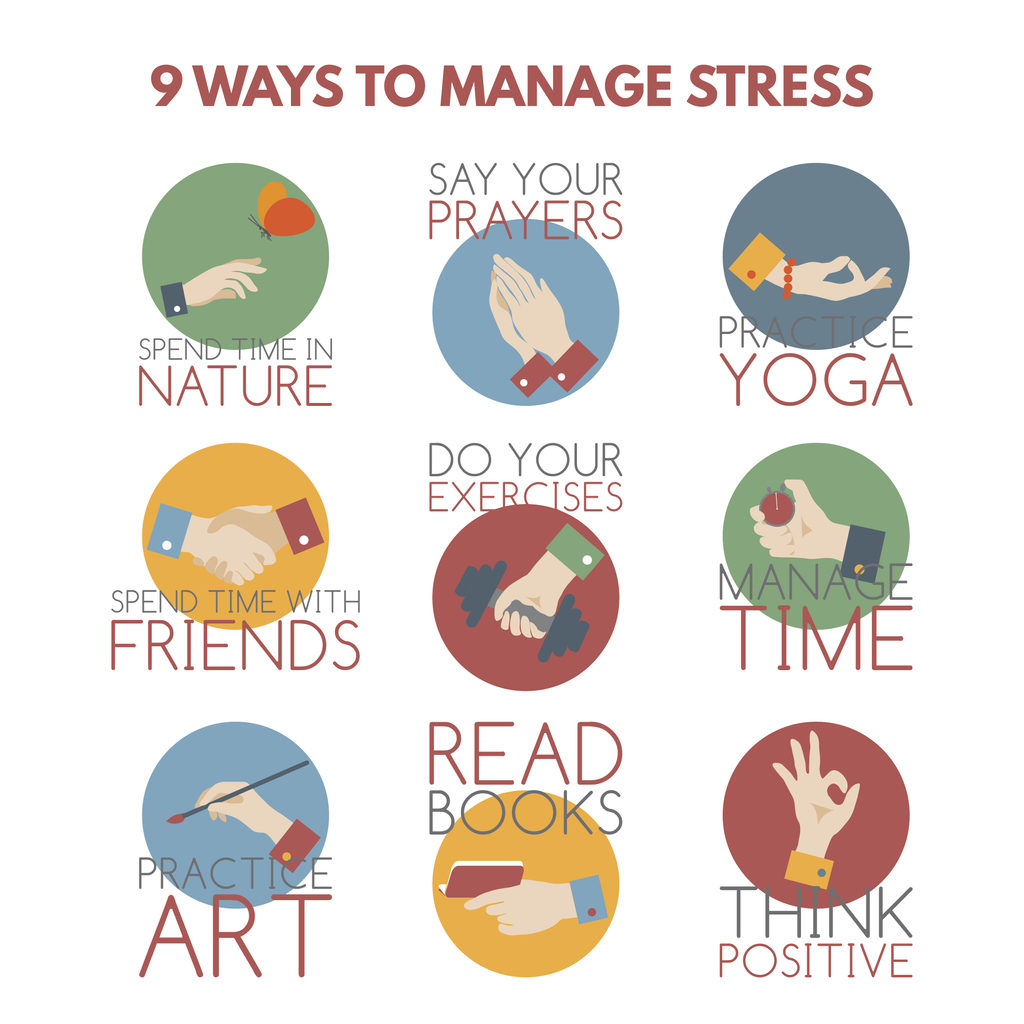
As you have seen, short-term stress management techniques are to be avoided.
It is better to choose a long-term strategy as discussed above (1, understand / 2, measure / 3, test).
Two solutions are available to you :
– you can either experiment with anti-stress techniques on your own.
– or you can follow directly the Stress.app anti-stress program that combines the most effective methods.
On what basis can we say that ?
Well, our techniques have been tested by our team but also tested and validated by all users of Stress.app!
Each module has the effect of reducing your stress level.
Let’s look at some great methods that help you reduce stress and anxiety.
Learn to breathe well
You live because you breathe.
Having a good breath is by far the most important thing in your life.
In addition, we have seen that your stress is directly related to your breathing.
The more you are stressed, the more you breathe, the more you reduce your CO2 concentration and cancel out its effects (oxygenation, sedation and dilation).
By learning to breathe well on a daily basis, 24 hours a day, you simply learn how to better manage your stress.
Caution! It’s not about learning to do deep breathing and other yoga techniques. We have seen that poorly practiced, these techniques increase your stress.
It’s about learning to breathe better every second.
On Stress.app, it is not a breathing exercise that you will discover, but a protocol to better breathe at every moment.
Eating healthy and balanced
As we have seen in a previous chapter, wanting to eat healthy and balanced in our present time is an utopia, a dream.
Today, it is more about eating the least toxic possible.
Indeed, unless you have the chance to live in the countryside and grow your organic fruits and vegetables, those you buy at the market or supermarket will be loaded with chemicals.
And these chemicals contain endocrine disruptors.
As its name suggests, these chemicals will disrupt your endocrine system, your endocrine glands, those that release hormones to manage the proper functioning of your body and mind.
But even worse, some people do not eat any healthy living food and only consume industrial products.
These products are empty of all life, there are added vitamins and artificial minerals that do not have the same effects as a living natural food.
The sugar of a cake has different effects of the sugar contained in fruits and vegetables.
Vitamins and minerals added to cakes have effects different from those contained in vegetables or animal products.
All this to say that your diet will play a vital role in your stress reduction project.
It will be about eating the least toxic possible, organic natural foods, animal products without hormones or drugs, etc.
But as you will discover in the Stress.app program, eating perfectly healthy is also an illusion.
Indeed, a person who eats toxic food in an emotional state of peace and joy will be less stressed than a person who eats a perfect diet in an emotional state of deprivation, frustration and therefore stress.
Your emotional state is much more than what you eat.
Also, your ground, your digestion, is much more important than the food itself.
Eating a toxic food when you have an effective digestion is not a problem … however, if your digestion is fragile, even the healthiest food will hurt you.
The Stress.app program will teach you how to optimize your digestive capacity while optimizing your emotional state so that you can digest all your foods, while effectively eliminating any toxins that may be present.
Sports and being active
The human being is designed to be active.
Put sitting on a chair all day, and it will take him a few weeks to start feeling bad and stressed.
The reason is extremely simple : CO2!
Indeed, physical activity has the effect of producing a quantity of carbon dioxide, a product of metabolism.
As you know now, the more your cells produce CO2, the more they get oxygen (Bohr effect), the more they expand and the more they relax.
Physical activity is therefore a positive stress, an “eustress” that will improve the functioning of your body.
But beware !
There is a big difference between intelligent physical activity and intense sport.
When the first will bring you health and well-being, the second will plunge you into chronic stress, or even burn-out, as is the case for many athletes who have exceeded the physiological limits of their health and body.
The Stress.app program will teach you how to practice perfectly, that is how to produce maximum CO2 without ever exceeding your limits.
Rather than follow the famous quote “no pain no gain”, Stress.app will teach you the philosophy of “no pain max gain”.
Avoid polluted places
Another highlight!
Breathe and wander in the polluted air of a city will generate stress in your reptilian brain.
You do not imagine the amount of toxic chemicals flowing through the air.
To find out, wear a face mask for a day while strolling downtown.
At the end of the day, you will be surprised to see a black color inside your mask, a significant color of all the pollutants that would have cluttered your poor lungs if you did not wear a mask.
There are still hundreds of other strategies to reduce your stress in the long run.
Stress.app offers you a complete program to discover them all.
Stress.app, the best anti-stress training
Here we are !
Stress is an exciting subject because it affects us all, and especially more and more in the world today.
As the law of hormesis indicates: “everything that does not kill us makes us stronger”.
Unfortunately, we live in a world where stress exceeds our adaptive abilities.
Stress is killing us.
It is therefore urgent to reduce your stress level, to find the area of ”eustress”, positive stress that will make you stronger.
To do this, simply follow a complete program that will optimize each area of your life to find the balance.
Stress.app offers you this program.
30 private emails will gradually change your lifestyle to reduce your stress level.
Each technique you discover will normalize your temperature and increase your cellular oxygenation (apnea after expiration).
Based on users experiences, we have classified the modules to obtain the most efficient program possible.
The modules of the Stress.app program are therefore ranked in descending order : from most effective to least effective.
We believe so much in our training that we will give your money back if you do not improve your results of the two physiological tests (temperature + apnea).
For the first time in your life, you will finally be able to accurately track your level of stress, in order to reduce it concretely with infallible techniques and methods.
Do not suffer one more day from stress and anxiety, and start today the Stress.app official stress program by clicking on the link below!

